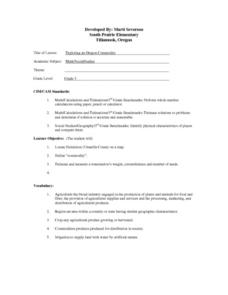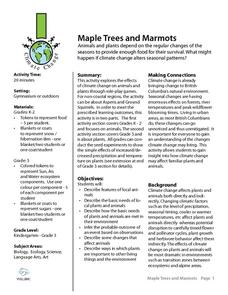Garden Earth Naturalist Club
Parts of a Flower! Flower Dissection
Sometimes the best way to learn about plants is to see the different parts of a plant yourself. Groups of learners dissect flowers to answer questions about what they observe and what they wonder about their flower.
Alabama Learning Exchange
Nature's Life Cycle
Become a member of the Pollution Patrol and stand up to litter! After discussing the life cycle of seeds and discussing how plants figure into the food chain, young conservationists engage in several activities involving podcasts,...
Kenan Fellows
Sustainability: Learning for a Lifetime – Soil
Do great gardeners really have green thumbs—or just really great soil? Environmental scholars discover what makes Earth's soil and soil quality so important through research and experimentation. Learners also develop an understanding of...
Roald Dahl
The Twits - The House, the Tree and the Monkey Cage
A house with no windows and a garden full of stinging nettles make the perfect home for Mr. and Mrs. Twit. The seventh lesson in an 11-part unit designed to accompany The Twits by Roald Dahl takes a closer look at the Twits' home...
Virginia Department of Education
Weather Patterns and Seasonal Changes
Get your class outside to observe their surroundings with a lesson highlighting weather patterns and seasonal changes. First, learners take a weather walk to survey how the weather affects animals, people, plants, and trees during...
Science Matters
Blubber Gloves: It’s All About Insulation
Instill the concept of adaptation with the help of Blubber Gloves—ziplock bags, shortening, and duct tape. Scholars discuss how animals and plants keep warm in polar regions, record their predictions, and try on their Blubber Gloves to...
Berkshire Museum
Adopt a Schoolyard Tree
Help young scientists connect with nature and learn about trees with a fun life science lesson. Heading out into the school yard, children choose a tree to adopt, taking measurements, writing descriptions, and drawing sketches of it in...
Curated OER
Exploring and Oregon Commodity
A fun (and delicious!) lesson teaches measurement to your third graders. They work in small groups to first predict, then to measure the weight, circumference, and number of seeds found in a watermelon. Everyone gets to eat watermelon...
Rain Bird Corporation
Rain Forest Teaching Curriculum
Take young naturalists on an exploration of the world's tropical rainforests with this extensive collection of lessons and activities. Whether its creating leaf and flower prints or investigating the absorption spectrum of chlorophyl,...
Purdue University
Trees of the Midwest
All trees are not created equal. A set of three wildlife conservation lessons has learners examine the characteristics of individual trees. They look at the life cycle of the tree using a story and reference a field guide to identify...
Education Outside
Grow an Art Garden: Plant a Rainbow
After a reading of Lois Ehlert's Planting a Rainbow, class members plan a rainbow garden, research growing cycles of the fruits and vegetables in their section, and then plant and maintain the garden.
Captain Planet Foundation
Help a Sister Out: Garden Companions
Explore Native American gardening traditions with a lesson on companion planting. Based on the concept that certain crops grow better when planted near other specific crops, kids research the gardening method with background links and by...
Curated OER
From Genes to Jeans
This unit of lessons is designed for 7th through 9th graders. They are introduced to the world of agriculture and the genetic research and various technologies that are associated with agriculture. Pupils work together to come up with a...
Calvin Crest Outdoor School
Survival
Equip young campers with important survival knowledge with a set of engaging lessons. Teammates work together to complete three outdoor activities, which include building a shelter, starting a campfire, and finding directions in the...
Curated OER
Speedy Succession
Fifth graders identify how a pond can change into a grassland. An ecosystems lesson where learners identify pioneer and climax species, and recognize that ecological succession can take up to 100 years or more. Some excellent activities...
Wild BC
Maple Trees and Marmots
Kinesthetic activities simulate animal activity as the seasons progress in a lesson that introduces climate change to primary pupils. The kids role-play maple trees collecting what they need to survive, but as each year comes around, the...
The New York Times
Trouble in the Hive: Researching the Decimation of Honeybee Colonies
Teach your class about colony collapse disorder and foster discussion about causes and solutions for the honeybee problem. Class members read and discuss an article and participate in one of two detailed activities about pollination and...
Code.org
Personal Innovations
Here's a resource designed to serve as an introduction to a computer science course. Groups brainstorm an innovation that may improve technology or use technology to solve a problem. The plan guides the teacher through the introduction...
Other popular searches
- Growing Plants From Seeds
- Seeds and Plants
- Plants and Seeds Dispersal
- Graphing Plants and Seeds
- Plants and Seeds Growing
- Plants and Seeds Ks2
- Plants and Seeds 7th
- Plants and Seeds Shooters
- Seeds and Plants Matching
- Worksheet Seeds and Plants
- Seeds to Plants
- Growing Plants Seeds



















